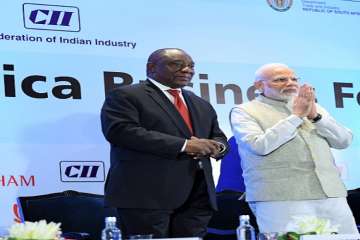India, South Africa announce 3-year strategic programme to boost ties in key sectors
The two leaders emphasised on concerted global action to deal with terrorism and called for adoption of the UN Comprehensive Convention on International Terrorism as well as the implementation of the UN Global Counter-Terrorism Strategy in a balanced and integrated manner.

India and South Africa on Friday announced a three-year strategic programme to expand ties in several key areas such as defence, maritime security and trade and investment after Prime Minister Narendra Modi held extensive talks with South African President Cyril Ramaphosa.
The two leaders emphasised on concerted global action to deal with terrorism and called for adoption of the UN Comprehensive Convention on International Terrorism as well as the implementation of the UN Global Counter-Terrorism Strategy in a balanced and integrated manner.
They also condemned terrorism in all its forms and manifestations regardless of its motivations, whenever, wherever and committed by whosoever, according to a joint statement.
Later, delivering the first edition of Gandhi-Mandela Memorial Freedom Lecture, Ramaphosa said Mahatma Gandhi and anti-apartheid revolutionary Nelson Mandela wanted to see a world where there was tolerance for each other's religion, race, caste and regional affiliations.
In their talks, the two sides also agreed to conclude an agreement on simplification of visa requirements and expressed intent to explore avenues to resume direct air connectivity between South Africa and India, the statement said.
The two leaders reiterated their commitment to working together on strengthening cooperation to address fugitive economic offenders, including through international organisations and institutions such as G20, Financial Action Task Force and others, it said.
Both sides also emphasised on the need for keeping the sea lanes in the Indian Ocean secure against illegal actors, holding that it was key to ensure prosperity of the region.
The joint statement said Modi and Ramaphosa expressed concern at the slow pace of UN reforms and committed themselves to securing their representation in an expanded UN Security Council.
In his media statement, Modi said both sides discussed all aspects of the bilateral ties with an aim to further expand cooperation in diverse areas.
The 'strategic programme of cooperation' is aimed at deepening the bilateral engagement and ensuring that a "result-oriented" partnership benefits people of both the countries.
The South African president, who arrived here on Friday morning on a two-day visit, will be chief guest at the Republic Day celebrations on Saturday.
Calling India a "strategic partner" of South Africa, Ramaphosa said he was "most honoured" to have been invited for the Republic Day celebrations.
"We reviewed the existing cordial bilateral relations between South Africa and India as encapsulated in strategic partnership, as well as the close cooperation at a number of multilateral groupings that our two countries belong to, where we work closely with one another," he said in his media statement with Modi by his side.
The two countries are part of BRICS, IBSA (India, Brazil, South Africa) Dialogue Forum, Indian Ocean Rim Association (IORA) and G20.
The South African president listed agro-processing, defence procurement and mining equipment and technology as the future areas of cooperation and said the two countries wanted to work together in these sectors.
Modi said the economic relations between the two sides are burgeoning and the bilateral trade stands at more than USD 10 billion. India is the second largest trading partner of South Africa.
This time South Africa participated in the Vibrant Gujarat Summit as a partner country and Indian companies are taking part in efforts to boost investment by President Ramaphosa, the prime minister said.
Modi said the two countries have strong cooperation and coordination at several international fora, including the BRICS, G20 and IORA and the United Nations Security Council.
South Africa is currently one of the 10 non-permanent members of the UNSC.
Modi said India and South Africa stand at crucial locations in the Indian Ocean and the two countries are inheritors of the legacy of Mahatma Gandhi and Nelson Mandela.
Speaking about the three-year 'Strategic Programme of Cooperation', Ramaphosa said, "In order to ensure concrete deliverables, we concluded a three years Strategic Programme of Cooperation aimed at deepening the bilateral engagement between India and South Africa and ensuring that a result-oriented partnership benefits people of both countries."
Officials said the strategic programme will facilitate expansion of ties in several key areas such as defence, maritime security and trade and investment.
Ramaphosa said the two sides have instructed their ministers and officials to start implementation of the programme with immediate effect.
Modi said India and South Africa are partners in skill development efforts and a 'Skills Institute' will soon be established in Pretoria.
The joint statement said both the leaders underlined the need for jointly working towards reform in the global governance architecture such as WTO, international financial systems etc. in order to promote inclusive growth.
The two leaders agreed that terrorism constitutes a serious threat to international peace, security and stability and that no country is immune to the threat that terrorism represents, it said.
The statement said they also agreed that both countries should explore solutions aimed at boosting trade and investment.
"In this context, President Ramaphosa agreed to simplify and reform South African business visa regime," it said.
The two sides also agreed to enhance cooperation in the field of the ocean economy.